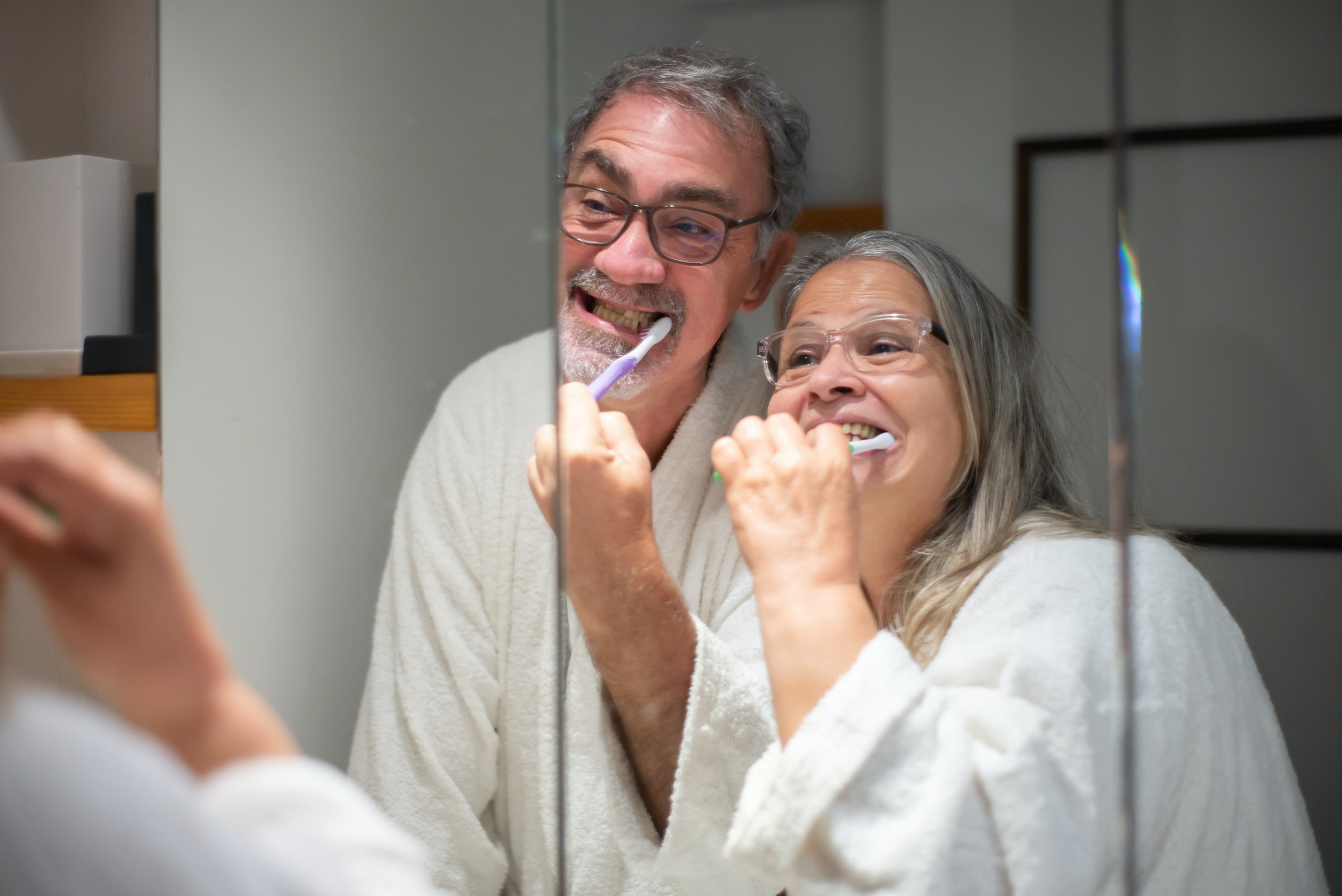Should You Brush Your Teeth Before or after Breakfast?
Every morning, as we groggily make our way to the bathroom mirror, a recurring question pops up: should we brush before or after breakfast? This seemingly simple routine choice has been the subject of much debate. Let's explore the significance of dental hygiene and how the timing of brushing can impact our oral health.
TLDR: Brush your teeth before breakfast to avoid damaging your enamel. If you prefer to brush your teeth after eating, wait at least 30 minutes so your mouth is not as acidic. Also, use a proper electric toothbrush.
Why the Timing of Brushing Matters
Our mouth cycles between acidic and neutral environments
Brushing whilst your mouth is more acidic can damage enamel
Every day, as we go about our routines, our mouth naturally maintains a certain balance. This balance is reflected in the pH level of our mouth (pH is how we measure the acidity of a liquid). On a typical day, without the influence of external factors like food or drinks, our mouth tends to have a neutral pH (around 7). This means that the environment inside our mouth is neither too acidic nor too alkaline, allowing for a healthy oral ecosystem.
However, this balance can be disrupted when we eat or drink. After consuming a meal or even just a snack, the pH level inside our mouth can experience a significant drop, sometimes going below 5.5. This might not sound alarming, but it's a critical threshold from a dental perspective.
When the pH dips below 5.5, our tooth enamel – the hard, protective outer layer of our teeth – becomes vulnerable. This state is known as enamel demineralisation, where the enamel starts to weaken and lose its essential minerals.
Now, imagine deciding to brush your teeth in this already vulnerable state. Brushing can exacerbate the situation, especially if done vigorously or with a hard-bristled toothbrush. Instead of cleaning the teeth, you might inadvertently damage the weakened enamel, increasing sensitivity and making the teeth more prone to cavities.
Thankfully, our bodies have a built-in defence mechanism against this acidity. Our saliva isn't just there to help us swallow food; it plays a crucial role in maintaining oral health. Saliva acts as a buffer, working diligently to neutralise the acidity in the mouth and restore the pH to a safer level. However, this isn't an instantaneous process.
Depending on various factors, including the food consumed and individual saliva production rates, it can take anywhere from 30 to 60 minutes for saliva to effectively neutralise the acids.
Given this, it becomes clear why the timing of brushing is so crucial. Brushing at the right time can ensure effective cleaning without compromising the integrity of our teeth.
Why It’s Better to Brush Before Breakfast
Brushing before breakfast will remove plaque bacteria left overnight so they don’t start multiplying by feeding on your breakfast
You will be brushing in a neutral pH environment
It gives you fresh breath and a fresh start to the day
Every night, as we drift into a peaceful slumber, our body goes into a rest mode, and so does our saliva production. This reduction in saliva flow creates an environment conducive for bacteria to multiply and flourish. These bacteria feed on the food particles left in our mouth and produce acids that can harm our teeth.
Brushing first thing in the morning ensures that these overnight guests are effectively removed. This keeps our oral hygiene in check and prevents these bacteria from feasting on our breakfast, multiplying further, and producing more acids.
When you first wake up, your mouth is more likely to be neutral and not acidic because you haven't eaten.
Why Some People Brush After Breakfast
To feel fresh for the day when leaving for work or school
To remove any food debris left over after breakfast
To allow the fluoride in toothpaste to sink into your teeth throughout the day
First and foremost, after enjoying a hearty breakfast, there's the undeniable presence of food particles. Whether it's a piece of granola, a strand of cheese, or the remnants of a smoothie, these particles can cling to the teeth and spaces between them. Brushing after breakfast ensures that these particles are effectively removed, preventing them from becoming a feast for bacteria or leading to potential dental issues.
Then there's the matter of post-eating freshness. Meals, especially breakfasts with intense flavours like coffee, onions, or certain fruits, can introduce new tastes and odours to the mouth. For many, stepping out for the day or moving on to the next activity with these lingering flavours feels incomplete. Brushing post-breakfast ensures that you remove these flavours and step out with a fresh, minty breath, ready to face the world.
From a psychological perspective, there's a sense of logical cleaning for many individuals. Just as one might wash dishes immediately after a meal or wash hands after a task, brushing teeth after eating feels like the logical sequence of events. It's about addressing the immediate aftermath and ensuring cleanliness.
Lastly, there's a dental health perspective to consider. Many toothpastes contain fluoride, a mineral known for its protective properties against cavities. Some argue that brushing post-breakfast allows the teeth to be coated with fluoride, offering prolonged fluoride protection throughout the day. This protective layer can protect against the harmful effects of foods or drinks consumed later in the day.
Considerations when deciding when to brush your teeth
Consider your preferences on how you want to feel. Do you want to feel fresh as soon as you wake up or leave the door?
Consider your morning routine as a whole and see how much time you have before and after eating breakfast
Several factors come into play when deciding whether to brush before or after breakfast. It's not just about following popular advice or mimicking what family members do; it's about understanding your habits and preferences to make an informed choice.
Firstly, consider your routine. Everyone has a unique morning rhythm. Some of us are early risers who, upon waking, feel an immediate rumble in the stomach, signalling it's time for breakfast. For these individuals, diving straight into a meal is the norm. On the other hand, some might prefer a slower start, perhaps indulging in a morning workout, meditation, or reading before even thinking about food. Your routine can significantly influence when it feels most natural to brush.
It's essential to introspect on your freshness preference. Oral hygiene isn't just about health; it's also about feeling good. Diving into breakfast with the night's residue still in the mouth might be off-putting for some. They prefer the sensation of starting their meal with a fresh, clean mouth. Conversely, others might prioritise ending their breakfast on a fresh note, ensuring they carry that clean feeling as they proceed with their day.
Lastly, It’s important to consider how much time you have. If you eat breakfast and rush straight out the door, you won’t have time to wait for a safe window to brush your teeth. If you are still home 30 minutes after eating, you can wait and brush your teeth before leaving when your mouth is no longer acidic.
Expert Opinions
Make sure you’re not brushing your teeth straight after eating breakfast. Allow yourself 30 minutes; if you can’t, brush before eating and use mouthwash afterwards to remove food debris.
Ensure you are using proper technique and a good toothbrush
Brushing before breakfast appears to be the most beneficial. Following your meal, rinsing with water or a mouthwash can help neutralise any acids or remove lingering food particles, ensuring a comprehensive approach to oral hygiene.
Of course, personal preferences and routines play a significant role in our daily habits. If you feel strongly about brushing after eating, there's a way to do it right. It's essential to wait 30-60 minutes post-meal before brushing. This allows saliva, nature's neutralising agent, to address the acidity of the food. While waiting might not always be convenient, especially in our fast-paced lives, it's a practice that many find beneficial and worth the wait.
It's crucial to remember that dental care, like any aspect of health, is deeply personal and individualised. What might be a miracle routine for one person might not yield the same results for another.
Additional Tips for Optimal Dental Health
Maintaining a radiant smile and robust dental health goes beyond the simple act of brushing. Here are some expert-recommended tips to ensure your teeth and gums remain in top-notch condition:
Fluoride Toothpaste: The importance of fluoride in dental care cannot be stressed enough. Often found in toothpaste, this mineral is a powerhouse for fighting cavities. Regular use can strengthen enamel and reduce the risk of decay, so always opt for a toothpaste that boasts the cavity-fighting power of fluoride.
Post-Meal Rinsing: After enjoying a meal, giving your mouth a quick rinse is beneficial. This can help in washing away any lingering food particles. Additionally, chewing sugar-free gum can be a boon. Not only does it freshen your breath, but it also stimulates saliva production. Saliva, often dubbed nature's defence mechanism, is pivotal in neutralising harmful acids and aiding in remineralisation.
Regular Check-ups: It's easy to dismiss or postpone those annual dentist appointments, especially when experiencing no immediate issues. However, these check-ups are more crucial than they seem at first glance. Regular professional cleanings can help spot potential problems early on and ensure your oral health remains on the right track.
Electric Toothbrush: As we navigate the challenges of the modern world, it's only fitting to equip ourselves with current solutions. Enter the electric toothbrush. These devices, especially those with pressure sensors, offer a more efficient and thorough cleaning experience than their manual counterparts. They can reach areas that might be challenging with a regular brush and ensure you're not applying excessive pressure, which can be detrimental.
Floss: While brushing is essential, it's just one part of a comprehensive oral care routine. Flossing daily ensures that the spaces between your teeth, often a hotspot for food particles and bacteria, remain clean.
Incorporating these tips into your daily routine can pave the way for a lifetime of healthy smiles and optimal dental health.
Conclusion
In the grand scheme of things, there might never be a one-size-fits-all answer to the brushing conundrum. You must prioritise your comfort, stay informed, consult your dentist, and make choices that suit your unique needs and routines. Here's to sparkling smiles and robust dental health!


